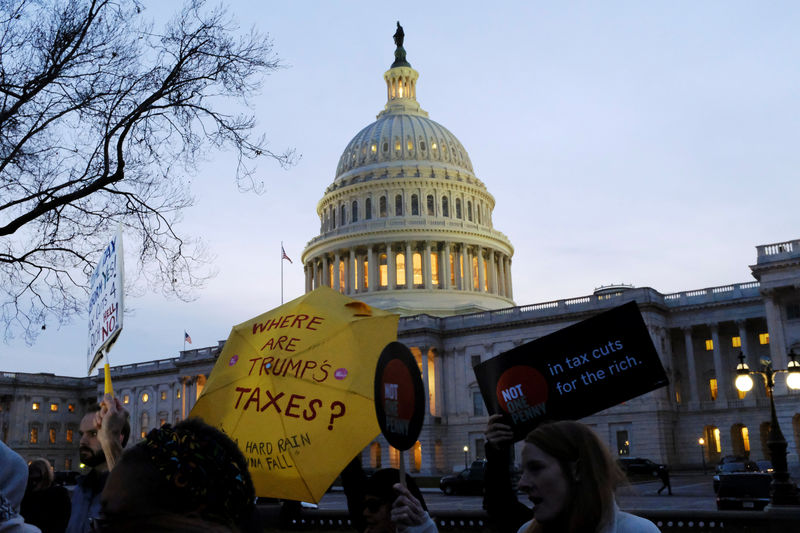 © Reuters. Demonstrators gather outside the U.S. Capitol to protest the Republican tax plan as it works through the Senate in Washington
© Reuters. Demonstrators gather outside the U.S. Capitol to protest the Republican tax plan as it works through the Senate in WashingtonBy David Morgan and Amanda Becker
WASHINGTON (Reuters) – Two more U.S. senators signed on to support a sweeping Republican tax bill on Friday but party leaders struggled to address the concerns of lawmakers worried about its impact on the federal deficit, healthcare and property taxes.
After negotiating deep into the night, Republicans resumed their hunt for enough votes to pass the bill. A key focus was raising $350 billion or more in tax revenues over 10 years to prevent the legislation from ballooning the federal deficit.
Senate leaders still were seeking commitments from three to five Republican members but said they were optimistic they had the 50 votes needed to pass the measure. Among the uncommitted were two fiscal hawk holdouts, Jeff Flake and Bob Corker.
“We are confident of the 50 and would like to build on that,” said John Cornyn, the No. 2 Senate Republican.
Republicans hold a 52-48 majority over Democrats in the Senate and have Vice President Mike Pence to break any tie votes.
Senators could move to a final vote late in the day after a procedural vote starting at 11 a.m. EST (1600 GMT) and a potentially chaotic process on amendments offered by both Republicans and Democrats.
Republican Senators Steve Daines and Ron Johnson announced their support for the bill on Friday after winning more tax relief for non-corporate pass-through businesses, which include partnerships, sole proprietorships and other companies not organized as public corporations. They encompass most American business enterprises, ranging from mom-and-pop concerns to large financial and real estate organizations.
The bill now features a 23 percent tax deduction for such business owners, up from the original 17.4 percent, according to statements from both senators.
President Donald Trump, still looking for his first major legislative accomplishment of his presidency, praised his fellow Republicans in Congress for their work in a Friday morning tweet and blamed Democrats for trying to derail the bill.
But Republicans still were searching for a way to get Corker and Flake on board. The legislation stalled late on Thursday when Senate rules prohibited adding a mechanism the two had sought to trigger tax increases in coming years if the bill fails to boost the economy enough to generate sufficient revenues to pay for tax cuts.
On Thursday, the nonpartisan Joint Committee on Taxation released a report saying the legislation would add $1 trillion to the deficit in the next 10 years, even with tax-driven economic growth projections factored in.
“Ideally we’d like to get everybody we can,” Senator John Thune told reporters, adding he would like to see “a trigger mechanism that works.”
COLLINS SEEKS CONCESSIONS
Senate leaders also said they think they can get holdout Susan Collins on board. She has pushed for concessions to minimize the impact on older and sicker Americans of a provision of the bill that would repeal part of the Obamacare health law.
Some senators also want to change the Senate bill so that state and local property taxes are deductible up to $10,000, which would mirror legislation already passed by the House of Representatives. As drafted, the Senate bill ends deductibility of state and local taxes entirely.
Senators were aiming to pass a bill this week and then agree later this month to final legislation with the House of Representatives, which their party also controls.
“This is the big enchilada,” said Senator Johnny Isakson of Georgia. “We’ve still got a chance to do something good and I’m going to try and do it.”
The Republican bill would be the biggest overhaul of the U.S. tax system since the 1980s and its success is crucial to Republican political prospects of keeping control of Congress in the November 2018 elections.
Republicans are examining options that could raise taxes at a particular point in the next decade.
“We have an alternative, frankly a tax increase we don’t want to do, to try and address Senator Corker’s concerns,” Cornyn said.
As drafted, the Senate bill would cut the U.S. corporate tax rate to 20 percent from 35 percent after a one-year delay and reduce taxes for some businesses and individuals, while ending many tax breaks.
Analysts said lawmakers could scale back tax cuts for corporations and top individual earners.
Asked if lawmakers would have to accept smaller tax cuts, Senate Finance Committee Chairman Orrin Hatch said: “We’ll have to see.”
Democrats have been united in their opposition to the bill, calling it a giveaway to the wealthy and corporations.
Source: Investing.com





























